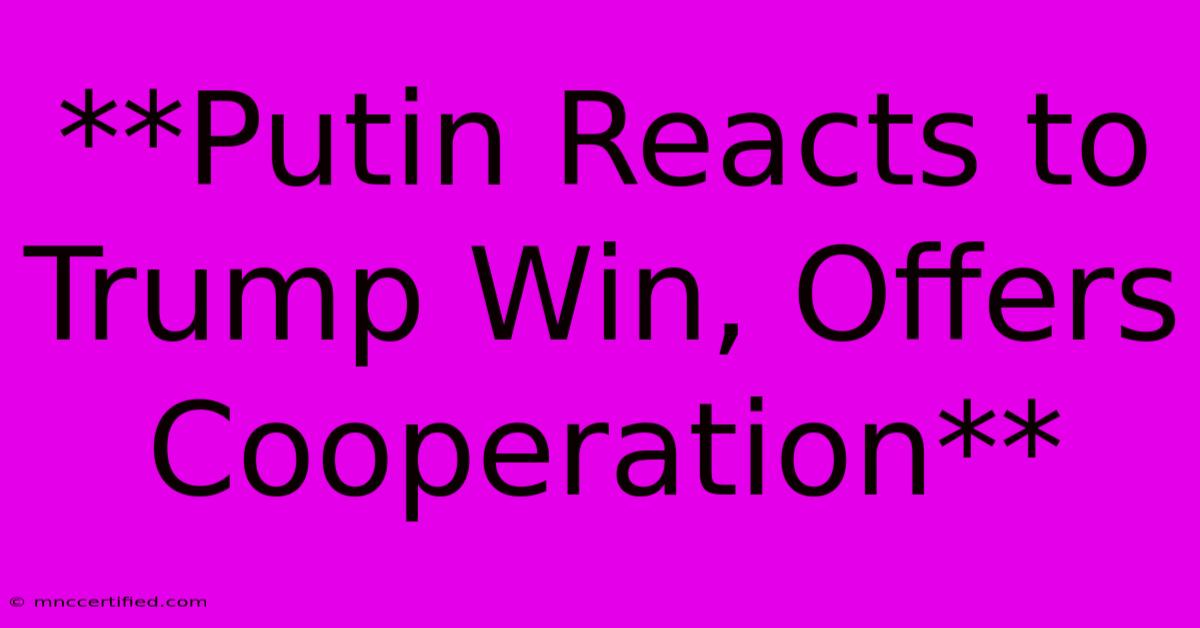**Putin Reacts To Trump Win, Offers Cooperation**

Table of Contents
Putin Reacts to Trump Win, Offers Cooperation: A New Era in US-Russia Relations?
The 2016 US presidential election saw a dramatic upset as Republican candidate Donald Trump emerged victorious. This unexpected outcome sparked international reactions, and perhaps none was more closely watched than that of Russian President Vladimir Putin.
A Shift in Tone:
Putin wasted no time in extending congratulations to the newly elected president, offering a message of cooperation and a desire to improve relations between the two countries. His statement, issued shortly after Trump's victory, expressed hope for a "constructive dialogue" and a "practical and pragmatic" approach to addressing challenges.
A History of Friction:
The relationship between Russia and the United States has been fraught with tension for decades, marked by ideological differences, geopolitical rivalries, and numerous diplomatic clashes. The Cold War era left a lasting legacy of suspicion and distrust, which has been further exacerbated by recent events, including the annexation of Crimea and the conflict in Syria.
Potential for Change:
Trump's campaign rhetoric suggested a willingness to engage with Russia in a more cooperative manner, potentially seeking common ground on issues such as terrorism and nuclear proliferation. This shift in tone presented a glimmer of hope for a potential thaw in relations. However, it remained unclear whether this optimism was grounded in reality or merely campaign rhetoric.
Challenges Ahead:
Despite the initial expressions of cooperation, significant challenges lay ahead for any attempt at resetting the relationship. Deep-seated disagreements over issues like human rights, democracy, and Ukraine continue to pose obstacles. Furthermore, the investigations into potential Russian interference in the US election added another layer of complexity and mistrust.
Early Signs of Collaboration:
Despite the challenges, some areas of potential cooperation emerged in the early days of the Trump administration. Discussions regarding Syria and the fight against ISIS, along with potential collaborations on nuclear arms control, offered glimmers of hope for a more constructive relationship.
A Wait-and-See Approach:
The future of US-Russia relations under the Trump administration remained uncertain. While initial signals suggested a potential shift towards cooperation, the long-standing challenges and ongoing investigations cast a shadow on the path ahead. The international community closely watched the developments, eager to understand the implications of this complex relationship for global stability and security.
Key Takeaways:
- Putin's initial reaction to Trump's victory expressed hope for a more cooperative relationship with the US.
- Despite this optimism, deep-seated challenges remain, including historical tensions, ideological differences, and ongoing investigations into Russian interference in US elections.
- Some areas of potential cooperation emerged, including collaboration on Syria, ISIS, and nuclear arms control.
- The future of US-Russia relations remains uncertain and will depend on the actions of both governments.
Further Considerations:
- Economic Ties: How might the relationship between the two countries impact economic cooperation and trade?
- Military Cooperation: Could potential collaborations on security threats like terrorism lead to increased military cooperation?
- Human Rights: Will Russia's human rights record continue to be a point of contention in the relationship?
Conclusion:
The election of Donald Trump marked a potential turning point in US-Russia relations. While the initial expressions of cooperation offered hope for a more constructive dialogue, the path forward remains uncertain and fraught with challenges. Only time will tell whether the two nations can overcome their historical differences and build a more stable and prosperous relationship.

Thank you for visiting our website wich cover about **Putin Reacts To Trump Win, Offers Cooperation**. We hope the information provided has been useful to you. Feel free to contact us if you have any questions or need further assistance. See you next time and dont miss to bookmark.
Featured Posts
-
Kansas Edges Unc Wins National Title
Nov 09, 2024
-
Insurance Claim Check Mortgage Company
Nov 09, 2024
-
Pet Shop Boys Debut Bowies All The Young Dudes Cover
Nov 09, 2024
-
How Much Is Jaw Surgery With Insurance
Nov 09, 2024
-
Threlkeld Earns International Rugby Call Up
Nov 09, 2024